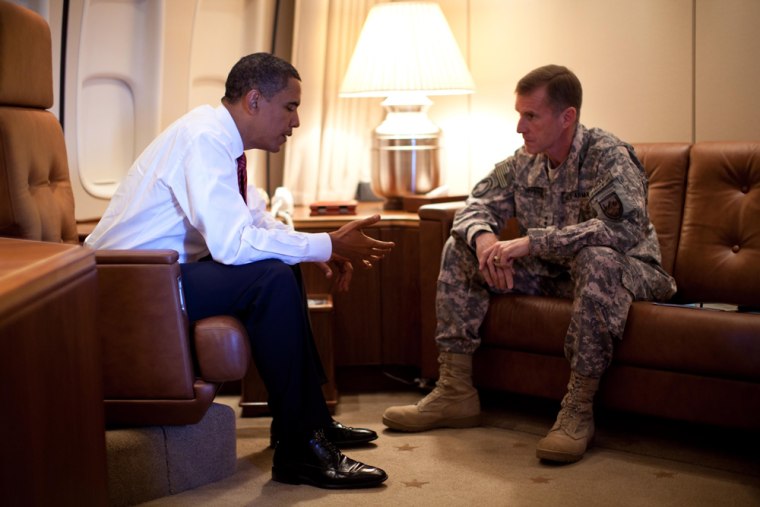At a pivotal point in the administration's Afghanistan strategy, President Barack Obama and his top Afghan war commander met privately aboard Air Force One on Friday for a talk the White House described as productive.
The 25-minute meeting with Army Gen. Stanley McChrystal, aboard Air Force One as it waited to carry the president home from Denmark, gave Obama a chance to step outside the circle of advisers he has convened to study the problem of Afghanistan. His war council has been sharing differing opinions on whether the U.S. should send thousands more troops to tamp down the Taliban, or shift to a narrower focus on al-Qaida in neighboring Pakistan.
The Copenhagen meeting was an extension of those war council sessions "as we reassess and re-evaluate moving forward in Afghanistan," White House press secretary Robert Gibbs told reporters afterward.
He said Obama and McChrystal "both agree that this is a helpful process." No decisions were made at their meeting, Gibbs said.
Obama was in the Danish capital to pitch Chicago's bid to host the 2016 Olympic games, and McChrystal was summoned there from London, where he gave a speech on Thursday warning that insurgents are gaining strength in Afghanistan and the U.S. needs to increase its efforts there.
Request for more troops
Hours after Obama and McChrystal met, the Pentagon said that the general's official request for more troops for the war will not be sent to the White House until next week at the earliest.
At issue is Obama's looming decision to stick with the current mission in Afghanistan — which could require adding as many as 40,000 additional U.S. troops — or scale back the military option and expand operations targeting terrorists in Pakistan.
Pentagon spokesman Bryan Whitman said Friday that McChystal's troop request is still at the Pentagon and a decision is not imminent. "I don't see anything in the short term. It is exceptionally, closely held," he said.
Without citing numbers publicly, McChrystal has said more troops are needed to "buy time" for the Afghan military and police forces to prepare to take control of the country in 2013.
The meeting was the third conversation between the two since McChrystal disclosed in a television interview that aired Sunday that he had spoken with Obama only once since taking over the U.S. military efforts in Afghanistan. Obama tapped McChrystal in May to replace ousted Gen. David McKiernan.
Obama and McChrystal spoke on Wednesday before Obama convened a meeting later that day of his war council, which McChrystal joined by video conference.
Waning support
The president had long been expected to approve McChrystal's plan to mount a military push against the Taliban in Afghanistan. But waning public support for the war and concern about his top commanders' call for as many as 40,000 more U.S. troops has exposed emerging fault lines inside the White House.
It's possible that Obama will decide on a hybrid strategy that keeps in place the 68,000 U.S. combat troops who are already in Afghanistan, while adding more military trainers and ramping up strikes on al-Qaida leaders in Pakistan.
Obama is holding two more meetings of his war council next week.
Obama's strategy review was prompted in part by a critical assessment of the war effort that McChrystal sent him last month.
On Wednesday, Obama chaired a meeting of his top military and national security advisers, pressing them for their views on how to proceed. Military commanders support the current strategy of targeting the Taliban, but other key officials divided.
Division in the ranks?
Secretary of State Hillary Rodham Clinton and special Afghan and Pakistan envoy Richard Holbrooke appeared to be leaning toward supporting a troop increase, while White House Chief of Staff Rahm Emanuel and Gen. James Jones, Obama's national security adviser, appeared to be skeptical of troop increases. Vice President Joe Biden also has been reluctant to support sending more troops, favoring a strategy that directly targets al-Qaida fighters who are believed to be hiding in Pakistan.
The assessment of divisions within Obama's inner circle came from a senior administration official who attended the meeting and spoke on the condition of anonymity, because the discussions were private.
Adm. Mike Mullen, chairman of the Joint Chiefs of Staff, and Gen. David Petraeus, the top commander for the wars in Iraq and Afghanistan, both support McChrystal's strategy.
More on: Afghanistan
